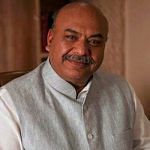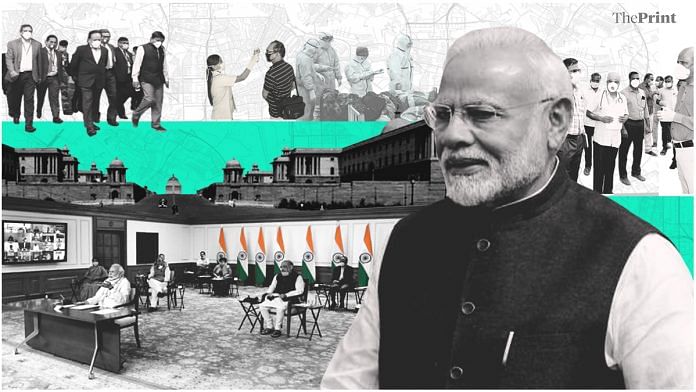Since announcing the nationwide lockdown on 24 March to contain the spread of coronavirus, Prime Minister Narendra Modi has been directly interacting with India’s civil servants. A core team of around 40-42 officers works under him in North Block. At the same time, neither home minister Amit Shah nor health minister Harsh Vardhan has been seen or heard making many public statements.
ThePrint asks: Modi works directly with civil servants during Covid: Lack of trust or shielding ministers?
Constant communication taking place between ministers and bureaucracy in fight against Covid
 Sudhanshu Mittal
Sudhanshu Mittal
Spokesperson, BJP
This question assumes that there must be something at fault with India’s fight against Covid-19. It is quite the opposite.
A group of ministers — headed by Rajnath Singh — has been constituted to interact with the political establishment. This means that inputs from all ministries are being taken into account. There is also an empowered group of secretaries. There is a clear and combined effort, which is the synthesis for any solution. In fact, the communication and decision-making across both the political hand and the bureaucracy, has been largely unanimous.
It is not just Prime Minister Narendra Modi alone who has been in constant communication with the chief ministers but also his cabinet colleagues. Even the principal secretary has been in touch with the chief secretaries of various states. There is no doubt that a multi-level communication is happening tirelessly to figure out the best possible manner to defeat the coronavirus.
We’re used to hearing disparaging reports of one-upmanship between the states and the Centre, but as you can see, those have now reduced with the coronavirus crisis. The statesmanship and political maturity necessary at this time have been exhibited at all levels of government.
PMO emerging as sole power not a good sign. Hope this is temporary setting for Covid crisis
 Rahul Verma
Rahul Verma
Fellow, Centre for Policy Research
The invocation of the National Disaster Management Act 2005 to deal with the Covid-19 crisis makes the Prime Minister’s office the focal point of all decisions. So, we are seeing a trickled down effect of command and control mode. The PMO has the responsibility to coordinate between two important task forces. One is the Group of Ministers led by Rajnath Singh and the other is the task force of civil servants.
Now since the Covid-19 battle is effectively being fought in the states, there is a need for inter-departmental coordination on which bureaucrats have a better handle. Political managers are needed to build consensus around political issues or act as troubleshooters if a political crisis is brewing. So far, such a scenario has not come up. Moreover, PM Modi has now been in at least four meetings with chief ministers since the lockdown through video-conferencing, and many members of PM’s cabinet can be seen in the room.
More than whether the PM is shielding his ministers or not trusting them enough, the bigger question is what kind of precedent is this going to set for the future. Parliamentary democracy is based on the notions of collective responsibility and PM being one among the equals. The PMO emerging as a sole power is not a good sign and I hope this is a temporary setting to deal with the current crisis.
Govt has always operated through civil servants, doesn’t seem it wants to shield ministers
 V. Ramani
V. Ramani
Retired IAS officer and former Director General of YASHADA, Pune
The Narendra Modi-led central government has operated through its civil servants on various public issues over the past six years. Ministers of this government have never been seen at the forefront of any initiative or programme. This reflects a sort of presidential system of functioning where the head of the government chooses the official s/he is comfortable with while executing a policy and stays away from relying on political colleagues.
I do not see a lack of trust or any intention to shield ministers. It is more to do with treating the Covid-19 crisis as a technical issue where experts do the job. The problem arises in a parliamentary democracy where state governments are run by politicians of different political hues and not by their civil servants.
When issues of public significance, like the movement of migrant workers, arise, politicians are better placed to understand the pulse of the people. Ham-handed measures, such as insisting on keeping migrants where they are only to force them into walking hundreds of kilometres home, could have been avoided if a coordinated political response between the Centre and the states had been chalked out.
Modi fears a successor may rise amid crisis. He prefers to go solo and uses ministers as courtiers
 Jaiveer Shergill
Jaiveer Shergill
Lawyer & Spokesperson, Congress
PM Modi wants a team of cheerleaders, not political leaders to fight Covid-19. Ever since his 2014 election campaign slogan ‘Abki Baar Modi Sarkaar’, the BJP went from a party dominated by ideology represented by the likes of Arun Shourie and Yashwant Sinha to a one-man party. The lotus symbol shrunk and Narender Modi became the dominating face.
This transformation stems from PM Modi’s obsession with branding, grabbing the spotlight and his style of politics where he would rather go solo than be a team player. He only uses his ministers as courtiers who merely clap or laud his schemes, initiatives and vision for India. He wants to stick to the model that in the BJP, he is both the message and the messenger. Unfortunately, even some ministers who have shown political talent have been reduced to yes-men.
Modi has shown insecurity towards potential challengers like Shivraj Chouhan and Raman Singh. He also limited the role of Sushma Swaraj to mere Twitter diplomacy, which reflects his intolerance towards sharing credit. He fears that a successor may rise amid the crisis.
Also read: How can Modi govt revive economic activity when CMs want migrant workers to return home?
By Pia Krishnankutty, journalist at ThePrint




Yes, fear of being second guessed or over ruled are the most common irritants for all eployees working in a one man army.
May India succeed against the virus with the least possible loss of life. That is all that matters. However, it is a fact that the talent crunch is visible from outer space.